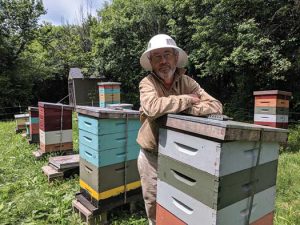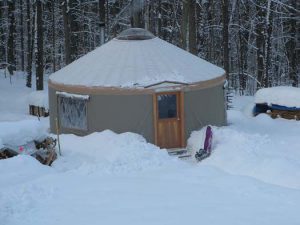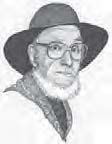By: Alice Eckles
Alice Eckles – I know you were a communications major in college, how did you end up keeping bees for a living?
Ross Conrad – I got into beekeeping after having a spiritual experience with a honey bee. During the Winter of 1990, I had a job that provided me with a lot of free time during the day and I found myself doing a lot of soul searching about the state of the world and my role in the world.
During this time, I was drawn to reading a number of books by Native Americans, in particular books by a Ojibwa native elder named, Sun Bear. Sun Bear ran a teaching community near Spokane, Washington where he taught native wisdom to anyone who wanted to learn and so that Winter I decided I was going to go out west and try to learn some native wisdom. During my time with the Bear Tribe, I participated in some of the ceremonies they were conducting and one of them was a vision quest, a right-of-passage a native person coming of age would go through as

Ross at home with his bees.
they seek their vision for their future and their path in life.
I fasted and prayed for four days and nights in a place on their land seeking a vision for my future. During my vision quest, I thought a lot about the deteriorating condition of the environment. Although it may seem tame compared to the environmental issues we face today, back then I recall some of my biggest concerns were the destruction of the rain forest and the disappearing whales. I wanted my life to bring healing to the earth in some way rather than to continue to be part of its destruction. I had become more and more concerned about the condition of the environment after growing up on Manhattan Island in New York City, and living in an environment in which all of the natural world had been destroyed and replaced with a man-made environment. I also had worked my way through college by traveling to Alaska for three Summers and working in a cannery that processed seafood. There I saw the tremendous amount of death our society imposes on the natural world in order to feed ourselves. These experiences had a big impact on me.
So, on the second day of my vision quest, I looked down and sitting on my big toe was a honey bee. It kind of startled me as I had not seen it come and land there. I had not heard it, or felt it. It just kind of appeared to me and I was worried at first but calmed down as it did not seem to be coming after me in a threatening way. It was just sitting there. Now one of the things I had learned was that many in the native community believe that everything in the natural world has something to teach us, if we are open to it in our hearts and our minds and so in trying to keep with the spirit of things, I looked at this bee and asked it what it had to teach me. Right then it took to flight and flew around me before landing on me again. It kept this up, flying around a bit and landing on various parts of my body for several minutes before it flew off.
I had never experienced anything like that before and found it kind of strange, but didn’t give it much more thought until the next day when I was sitting in the exact same spot and I heard a buzz in one ear and then a buzz in the other ear, and when I looked to see what it was, I saw what appeared to be a bee flying away as if to say, “don’t forget what I told you.” While the bee seemed to be trying to communicate something, I did not have a clue what it may have been trying to tell me. Then about seven months or so later, after returning home to Middlebury, Vermont a commercial beekeeper, Bill Mraz, for whom I had worked for part-time helping one season with the honey harvest a couple years earlier asked me if I wanted to work full-time keeping bees with him and his father. Now I think most people in their right mind don’t jump at a career opportunity to work with millions of stinging insects that can potentially kill you, but because of the experience I had during my vision quest, I decided to take the job. Between them, Bill and his father Charles Mraz of Champlain Valley Apiaries in Middlebury had over 100 years of beekeeping experience and working for the Mraz’s turned out to be a great education in beekeeping.
AE – When we first met you were writing a book, Natural Beekeeping, later published by Chelsea Green. What made you realize you had a book to write on the subject?
RC – Once I started working for a commercial beekeeper, I of course wanted to get a few hives of my own. In caring for my own colonies of bees, I refused to use pesticides to control mites and did not want to use antibiotics to control diseases, so I had to find alternative ways to help

This mean green beekeeping machine was converted to run on waste vegetable oil by students at our local vocational/technical school.
keep my bees healthy. Back in the 1990s, there was precious little information available on beekeeping without chemicals and drugs. The internet was not as ubiquitous as it is today. Gunther Hauk had written a book on biodynamic beekeeping and the New Zealand beekeepers association had published a book on controlling American Foulbrood without the use of drugs, but that was all I could find on alternative beekeeping methods. This led to a lot of experimentation and trial and error. Once I found a formula that allowed my bees to survive the harsh Vermont Winters most of the time despite being challenged by mites and their accompanying pathogens, I decided to write about it for other beekeepers who might like to learn from my experiences. Someone once said that if you want to read a book about something and find it has not been written, you should be the one to write it, so that is what I did.
AE – Why did you feel you couldn’t in good conscience use the same pesticides and antibiotics as the commercial beekeeping operation where you were working and why should beekeepers use alternative and organic methods instead?
RC – Chemical beekeeping with pesticides, antibiotics and the regular use of artificial diets work to control starvation as well as pests and disease (until resistance develops) but they also cause sub-lethal stress that undermines the health of the colony and can compromise the final products of the hive. If diseases, pests and nutritional issues can be controlled without adversely affecting the health of the bees, the beekeeper, or the final product then why would we not prefer that approach? I view this type of beekeeping as simply an extension of what the bees teach us, which is to do no harm, or the smallest amount of harm possible, while at the same time giving back in a way that makes the world a better place.
AE – I feel like this has been the story of our lives. How would you say we have incorporated this beekeeping philosophy into our lives?
RC – Well beekeeping is only one way to help manifest the wisdom of the honey bee into our everyday lives. It also inspires me to bring the rest of my life into alignment with the wisdom of the honey bee.
AE – Is living in a yurt part of that story?
RC – The incredible damage that the production, transport and use of the coal, oil and gas fossil fuels does to our planet and our lives really hit home for me when the BP Oil spill occurred in 2010. As you know, after seeing all the media coverage of the environmental and human devastation that spill inflicted we decided we didn’t want to be a part of the fossil fuel pipeline any more. We were living in an apartment in town with oil hot water and heating systems. We had just recently bought a piece of woodland where we wanted to build a cordwood masonry home and we decided why wait, let’s get a yurt and move onto our land now, saving us money on rent and removing us from the end of the fossil fuel pipeline.
Fossil fuels are so easy and convenient to use, they are very seductive and are a hard habit to break. We found this out when we learned that the biggest energy consumption sector in the entire food chain is the refrigerator. We tried to live without using it while in the apartment, but we failed miserably in this effort. When it is there, you use it. We had to place ourselves in a situation where we simply didn’t have the option to be able to use a fridge before we figured out how to live comfortably without one. Part of this learning curve was to switch to a primarily vegetarian diet, heavy in local and organic foods. Not only is such a diet generally healthier and have a smaller environmental footprint, but it is much safer when you don’t have good refrigeration.
Placing ourselves into a situation where we didn’t have any electricity, no indoor plumbing or septic, and no fossil fuels at our command forced us to develop alternative systems that could replace the conveniences and benefits they normally provide. When you live with fossil fuels on a daily basis and rely on them for survival, you’re in a crisis when they are suddenly not there. It is very different when you voluntarily choose to live without fossil fuels and take the time to plan and develop the alternative systems to replace the jobs that fossil fuels would normally do for you. We quickly realized that this was the perfect way to develop the systems we would need to run the house we were planning to build as part of our ongoing experiment in trying to live while consuming the least amount of fossil fuels possible in our home. So far we have got it down to the equivalent of 15-20 gallons a year – mostly to run the chainsaw and snow blower.
AE – I love the way it didn’t stop with the yurt. Can you explain all the features of the house we are building that align with the wisdom of the honeybee?
RC – The home we have started building will be partially underground. Two walls will be bermed and we will have a green living roof with plants and bees on it to allow us to take advantage of the natural insulating properties of earth. A green roof also allows us to reduce water run-off, and eliminate the heat-island effect created by man-made building materials. Our property is in the woods, and since we have a ready supply of fuel on site, we have installed a masonry heater, cook stove, and oven since masonry heaters are the most efficient way to heat with wood. We are incorporating a composting toilet into our house design along with a modest photo-electric solar installation.
AE – How do you travel without fossil fuels? And how have we managed to use even fewer fossil fuels for transportation recently?
RC – One of the biggest uses of fossil fuels for many people is transportation. Since 2005 I have been driving diesel vehicles that have been modified to run on waste vegetable oil that I collect from local restaurants. (see Bee Culture September 2008) We installed a photoelectric solar

One thing you notice about living in a yurt is that it is acoustically transparent. If you live in the woods, the sounds of the animals, the wind in the trees and the pitter patter of rain make up your soundtrack.
system on our land in 2018 and so in 2019 we bought a used electric vehicle so now we can power our transportation, at least partially, with the fossil-fuel-free electricity we produce at home.
It always came across as hypocritical to me to suggest that others stop burning fossil fuels when I was using them all the time. However, once I made changes that brought my life into better alignment with my values, I was empowered to reach out into the broader community and begin to push for changes there. Thus, I have since become more involved in my state and local politics and currently serve on my Town’s Energy Committee and my County’s Regional Planning Commission.
For me beekeeping is not only part of my effort to create right livelihood for myself, but also a spiritual pursuit that constantly informs my decisions and provides inspiration. The typical colony requires 150-200 pounds of honey to get through an entire year, and even though it is estimated that the average worker bee can only produce 1½th of a teaspoon of honey over its entire lifetime, it doesn’t fall for the illusion that what it does is insignificant. In the same way the cumulative impacts of all our decisions from whether we vote, to the sources of the energy we use and the foods we eat may seem insignificant, but they matter. As fellow Vermont beekeeper Kirk Webster has pointed out, our old way of life is dying and a new way is struggling to be born. Are we going to spend our precious time participating in the death or the birth? They are both happening at the same time so we have to choose.
AE – Tell us about your latest writing project.
RC– I have just co-authored a book on the history of beekeeping in Vermont. It is not a complete history but covers all the major events, many of the beekeepers, and most importantly the unique skills of Northern queen production and overwintering that Vermonters have excelled at. Skills that I think beekeepers throughout the northern reaches of the U.S. and Canada can benefit from.
AE – What do you do for enjoyment?
RC – For enjoyment I tend to watch movies, go for walks in the woods, share meals with friends, listen to music and play games or work on puzzles, but mostly I am enjoying everything that I do in life. Working with the bees and the natural world in a way that is meaningful to me; Meeting interesting and innovative beekeepers from all over the world; Trying to figure out how to live more sanely in a world that seems more and more chaotic and insane with every passing year. Life is an incredible adventure.








